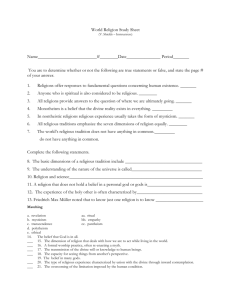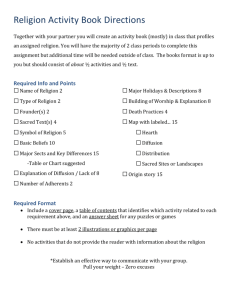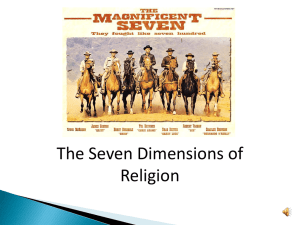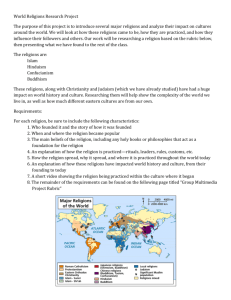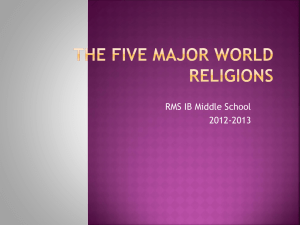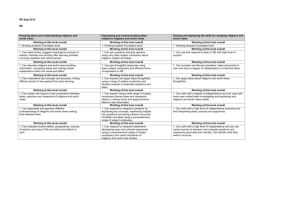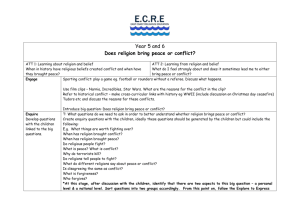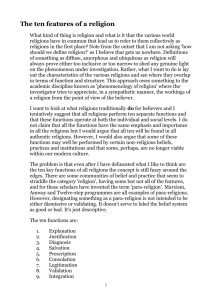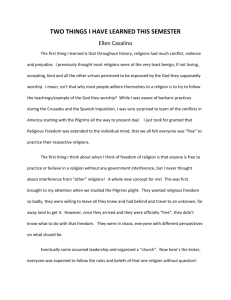Religion and Human Rights: An Overview
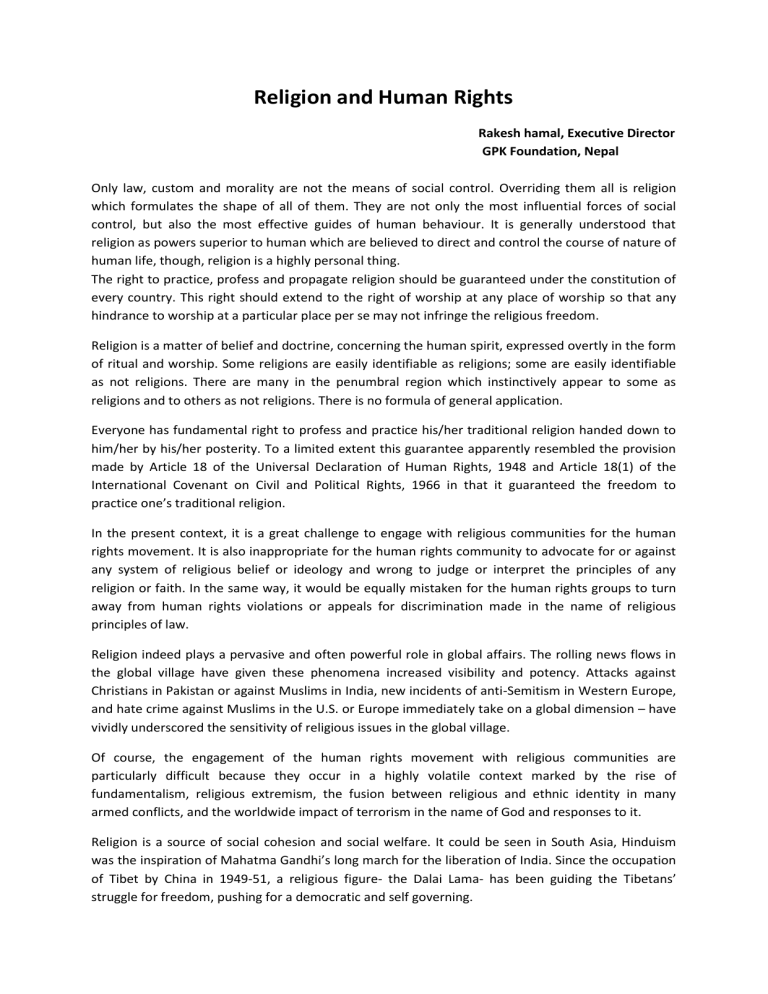
Religion and Human Rights
Rakesh hamal, Executive Director
GPK Foundation, Nepal
Only law, custom and morality are not the means of social control. Overriding them all is religion which formulates the shape of all of them. They are not only the most influential forces of social control, but also the most effective guides of human behaviour. It is generally understood that religion as powers superior to human which are believed to direct and control the course of nature of human life, though, religion is a highly personal thing.
The right to practice, profess and propagate religion should be guaranteed under the constitution of every country. This right should extend to the right of worship at any place of worship so that any hindrance to worship at a particular place per se may not infringe the religious freedom.
Religion is a matter of belief and doctrine, concerning the human spirit, expressed overtly in the form of ritual and worship. Some religions are easily identifiable as religions; some are easily identifiable as not religions. There are many in the penumbral region which instinctively appear to some as religions and to others as not religions. There is no formula of general application.
Everyone has fundamental right to profess and practice his/her traditional religion handed down to him/her by his/her posterity. To a limited extent this guarantee apparently resembled the provision made by Article 18 of the Universal Declaration of Human Rights, 1948 and Article 18(1) of the
International Covenant on Civil and Political Rights, 1966 in that it guaranteed the freedom to practice one’s traditional religion.
In the present context, it is a great challenge to engage with religious communities for the human rights movement. It is also inappropriate for the human rights community to advocate for or against any system of religious belief or ideology and wrong to judge or interpret the principles of any religion or faith. In the same way, it would be equally mistaken for the human rights groups to turn away from human rights violations or appeals for discrimination made in the name of religious principles of law.
Religion indeed plays a pervasive and often powerful role in global affairs. The rolling news flows in the global village have given these phenomena increased visibility and potency. Attacks against
Christians in Pakistan or against Muslims in India, new incidents of anti-Semitism in Western Europe, and hate crime against Muslims in the U.S. or Europe immediately take on a global dimension – have vividly underscored the sensitivity of religious issues in the global village.
Of course, the engagement of the human rights movement with religious communities are particularly difficult because they occur in a highly volatile context marked by the rise of fundamentalism, religious extremism, the fusion between religious and ethnic identity in many armed conflicts, and the worldwide impact of terrorism in the name of God and responses to it.
Religion is a source of social cohesion and social welfare. It could be seen in South Asia, Hinduism was the inspiration of Mahatma Gandhi’s long march for the liberation of India. Since the occupation of Tibet by China in 1949-51, a religious figure- the Dalai Lama- has been guiding the Tibetans’ struggle for freedom, pushing for a democratic and self governing.
We can also remarked that the civil rights movement in the United States was powerfully inspired by religious figures, among whom Martin Luther king, stands as an icon, and was in many cases supported by mainstream Christian and Jewish denominations.
The decades of the 1980s and 1990s, in South Africa, Jews, Christians, and Muslims fought apartheid, in alliance with secular or even Marxist-inspired organizations such as the South African Communist
Party and the African National Congress for the defense of dissidents and fundamental freedoms of expression, belief, and movement.
In the name of freedom of expression and belief, religion has been a part of bloody conflicts that have engulfed dozens of countries in the last fifteen years. In Ireland, Cyprus, the Balkans, Rwanda,
Burma, Srilanka, Nigeria, Sudan, Israel/Palestine, the Phillippines (Mindanao), and Indonesia, individuals acting in the name of religion have played an important role in crystallizing group hatred and violence.
In the present context, the attention given by the secular human rights movement to issues linked to freedom of speech, gender, and sexuality and sexual orientation-always inherent in the human rights ideal, but of growing prominence today- increasingly clashes with the positions taken by many religious groups.
The growing tensions between religious and rights communities also have led religious leaders at times to subdue their antagonisms and rivalries to defend common approaches on what they consider shared tenets of faith. The coalition between the Holy See and the International Islamic
Conference, for example, has been evident in U.N. Conferences on population issues and women’s rights. The new prominence of so-called ethical issues has created an at times impious convergence among representatives of some mainstream religions; states that are serious human rights abusers, like Saudi Arabia, Iran or Sudan; and in many cases.
Religion is as old as mankind. So, in a nutshell, we can say that rather than trying to enshrine the human rights project into different faith and cultures, of trying to legitimize human rights norms within religions and not alongside or against them human rights activists might be tempted to dismiss such faiths and cultures as obstacles to economic or human rights modernity.
The best way forward of confrontation with a growing assertion of religion in private life, the increased political power of religions, and the rise or revival of religious conservatism, the human rights community must step up with a clear message and a distinctive voice. Neither the religious community nor the human rights movement should sacrifice its most value principles and objectives in order to gain political power or social fame. Every stake holders of the human society must acknowledge that religion is also the source of social cohesion and social welfare.
References
Justice Basu Palok, Law Relating to Protection of Human Rights under the Indian Constitution
and Allied laws, modern law publication, 2002.
Michael Ignatieff, Human Rights as Politics and Idolatry, Princeton University Press, 2001.
Harold R. Isaacs, Idols of the Tribe, Group Identity and Political Change, Cambridge,
Massachusetts, Harvard University Press, 1989.
Jeri Laber, The Courage of Strangers: Coming of Age with the Human Rights Movement, New
York, Public Affairs, 2002.
Margaret E. Keck and Kathryn Sikkink, Activists beyond Borders ,Ithaca, New York: Cornell
University Press,1998.
Ken Booth, “Three Tyrannies,” in Tim Dunne and Nicholas J. Heeler, eds., Human Rights in
Global Politics , Cambridge (U.K.): Cambridge University Press, 1999.


